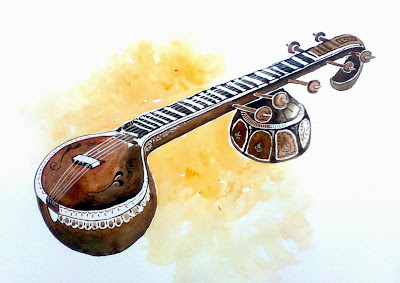
Music is one of my primary passions. Music is love. Music is life. I don't claim to have any great knowledge about it. Yes, I am making a serious attempt to know more. It keeps me spirited.
I have patiently waited for autos unmindful of the elapsed time (once it was more than an hour!), practising my music lessons on the road. And on another occasion I was told by a colleague that, during a long wait at a signal I was sitting and singing in the auto and all vehicles were looking at me. Music keeps me in the free, nature-undisturbed state.
I have listened to many forms of music with passion and craze at different levels. I grew up listening to Hindi film songs primarily. Here I was immensely fascinated by Gulzar's lyrics and still am, though I rarely listen to these now. Further on, I listened to few Tamil and Malayalam film songs, ghazals, Punjabi and Rajasthani folk, Rabindra sangeet (the life of Bengal, here again lyrics are the soul, so you should have a Bengali friend by your side), Apache Indian's rap (I now find it crap - there's no music in it), western light and rock – Michael Jackson, Madonna, Bryan Adams etc. I have not heard Western classical at all, I used to find it monotonous and switch off the radio back then in school.
Only since the last seven or eight years, I have entered the Carnatic realm. Here, my concentration has been on music and not on lyrics. Music is all about depth and the depth that Carnatic offers is unexplainable. You have to patiently listen to it to feel it and understand it. One need not have a sweet voice to sing Carnatic songs. What is required is very keen listening.
The
raagam patterns, the
taalam structure both are very profound and make it incomparable to any other system. It is a system which gives infinite scope for creativity. Primarily, here the compositions are in Telugu and Sanskrit. I usually don't know the word-by-word meanings, sometimes the overall theme also of the songs that I sing. Of course, the more one knows the better it is. It helps more to know the spiritual meanings etc.
Pure(?) works in any field – art, literature, science etc. is not reachable to the mass. They don't have immediate appeal. Take Shakespeare, Carnatic, Hindustani, Ramanujam's theorems, art movies etc. People in pure and applied fields have to coordinate and arrive at something which the society at large can relate to. Of course, this doesn't happen often in reality. Also, many times people work for self-contentment without expecting any recognition. I see no flaw in that. To each, his own.
The Carnatic trinity – Tyagaraja, Muttuswami Dikshitar and Shyama Shastri whose compositions are the main references for the system have lived lives of saints. Most of their compositions are known to be unplanned spontaneous outpourings. All of them used to sing on streets among huge groups of people. And the food they ate was the bhikshai they received from people.
Purandara Dasa and other Haridasas who lived much before the trinity had social reformation in their minds. Most of their works are in very simple Kannada aiming to reach all kinds of people. These are also devotional in nature. They involve both ordinary family life situations as well as songs in praise of God. They used to move around on the streets in groups and sing for people in general. The best part is that many of their compositions treat God as a friend instead of a superior. They have a very calming effect, and provide strength and courage to people.
Sadly, Carnatic music is increasingly being potrayed as caste music. We are ill-informed of the facts, beacuse it is propogated wrongly. MS Subbulakshmi, one of the greatest musicians who succeeded in bringing Carnatic to the masses, hails from a Devadasi non-brahmin family. Of course, one main reason why this could happen was that her husband Sadasivam was a influential brahmin. There is the Dhanammaal school which has propogated rich and pure classical music and dance for generations. Their school is an expert in teaching the art, they are regarded as musicians' musicians. As far as I know Dhanammaal was also not a brahmin. There are numerous other examples like Sheik Chinna Moulana, T Rajaratnam Pillai, John Higgins etc.
It is very sad that it has become popular as Brahmin music to a great extent. So, when I go to concerts today, I do find a huge group of
mamis dressed in rich
pattu saris sitting and chatting happily during the concert. In fact, I happened to ask a popular musician and friend a couple of years back, if they do something to spread this music to other classes. He said he tried convincing some of them to come for his concerts. But, there is a strong revolt, they feel uncomfortable with the idea of
sami pattu. Also, they hardly have time for any extra activity, given the laborious work they need to do each day to earn their daily bread.
